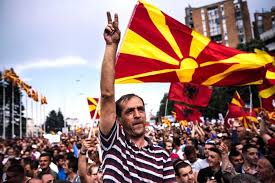Crisis in Macedonia
May 10, 2017 | Expert Insights

Political unrest in The Former Yugoslav Republic of Macedoniaresulted in citizens rallying for fresh elections just six months after the parliamentary elections of 2016. The tension escalated with the election of an ethnic-Albanian lawmaker as speaker. The Social Democrats who gained parliamentary majority by going into coalition with ethnic-Albanian minority parties, is now facing opposition not just from the President Gjorge Ivanov but also from the former Prime Minister Nikola Gruevski who is reluctant to let go his control over the government.
Macedonian Parliament in chaos?
Macedonia has been in a state of political turmoil since the year 2015. Protests were made against the Prime Minister Gruevski and other officials for being involved in corruption and misuse of powers. The tension escalated when the President Ivanov attempted to stop the investigations. This unrest was called the “Colourful Revolution”. The Social Democrats along with other opposition parties demanded for the impeachment of the Prime Minister and replacement of the government. On 11th December 2017, early parliamentary elections were held with the Social Democrats attaining the majority. Despite gaining majority, the party is facing a major backlash from both its citizens as well as from the President. Mr Ivanov claimed the Social Democrats were threatening the unity of the country by offering concessions to Macedonia's ethnic-Albanians. Therefore, he could not allow them to take office. On 27th April 2017, 200 protesters stormed into the parliament and attacked the law makers and ministers. The protesters now demand for a new government and fresh elections.
Albanians in Macedonia
The ongoing protest in Macedonia has an ethnic background to it. Macedonia never had a coalition government due to the government being reluctant in accepting the ethnic-Albanian minority and also its reluctance to recognise as the second official language. Evidence of the same is insurgency in Macedonia in 2001 and inter-ethnic violence in 2012. Both these incidents depicted how the ethnic Macedonian majority and ethnic-Albanian minority have not been able to co-exist peacefully. The current breakdown in the parliament is another example where the Macedonian majority being reluctant to accept a coalition government of ethnic minority Albanians governing them.
Assessment
Though the Social Democrats have promised that they would bring about law and order in the country, the chances of this being achieved seems bleak. There is a high probability of the violence escalating. The difference in ideologies, religion and ethnicity act as a contributing factors in aggravating the already tensed situation. Despite international criticisms from NATO and the European Union, the incumbent President Ivanov continues to support the former Prime Minister. This is one of the biggest hurdles that Social Democrats have to face if they aim to stay in power. Unless ethnic minorities are not accepted and recognised by the majority in any country, peace in its true sense cannot be attained.








Comments